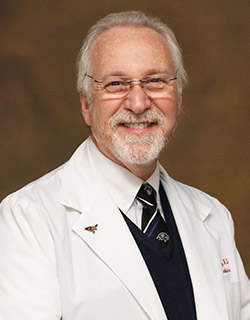Managing Heart Disease During COVID-19
March 31, 2020
*This is a rapidly changing situation. This video was filmed on March 31, 2020. For the most up-to-date information, visit the CDC website at www.cdc.gov*
What People with Heart Disease Should Know about COVID-19
Of the people hospitalized with the coronavirus (COVID-19), 40% have underlying conditions like heart disease and lung disease. Dr. Kevin Ferentz, Chairman of Family Medicine at GBMC, talked about what people with heart disease need to know about COVID-19 and the steps they can take to lower their risk of contracting the virus.
“80% of people who get infected with this virus will only experience mild cold or flu-like symptoms,” he explained. “20% of people with COVID-19 will have more significant symptoms and 5% of those people will be hospitalized. If you have heart disease, diabetes, or lung disease, data have shown that you’re at a greater risk for more significant symptoms, especially if you’re 65 or older. The best advice is to take social isolation seriously to limit your potential exposure to people who have the virus and could spread it to you.”
Dr. Ferentz noted that people with well controlled high blood pressure do not seem to be at higher risk, but those who have advanced coronary artery disease, advanced heart failure, or have had a heart attack do appear to be at greater risk. He also shared advice for people who are caregivers for people with advanced heart disease, stressing the importance of frequent, proper handwashing and practicing social distancing (staying at least six feet away from others) when outside the home.
If you have heart disease and think you may have been exposed to the virus, you should contact your primary care doctor right away and arrange a video visit. You may also want to call your cardiologist. If you have symptoms such as shortness of breath, difficulty walking without getting out of breath, or chest pain, your doctor will want to check on you on a regular basis.
Dr. Ferentz also debunked a dangerous rumor about blood pressure medications and COVID-19. “There has been inaccurate information circulating that people who take ACE inhibitors are increasing their risk of getting a more serious case of COVID-19. That’s simply not correct. There is no current data to support the claim,” he said. “In fact, if you stop taking your medication, you are significantly increasing your risk of stroke or heart attack, so stay on your medication. If you have concerns, call your doctor for guidance.”
Other topics covered included the importance of continuing to exercise (while following social distancing guidelines), exercise options you can do at home without any special equipment, websites that provide trustworthy information for people with heart and lung disease, and the importance of getting your flu vaccine and, if recommended by your doctor, pneumonia vaccine, although that immunization does not protect against the viral pneumonia caused by COVID-19.
Added Dr. Ferentz, “Don’t get your information from the news. There’s potentially inaccurate information and an element of panic there at times. Get your information from your doctor and trustworthy websites.” The American Heart Association, the American Diabetes Association, and the American Lung Association are excellent resources for reliable information.
*Click here for more information about the coronavirus (COVID-19)*






